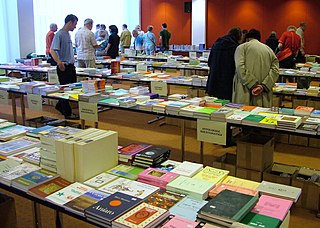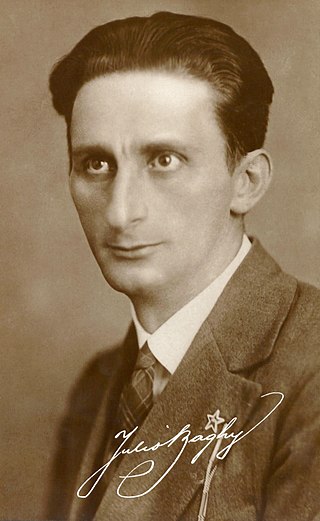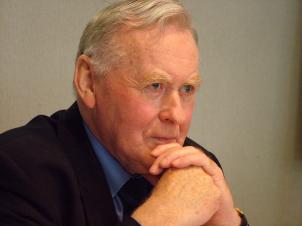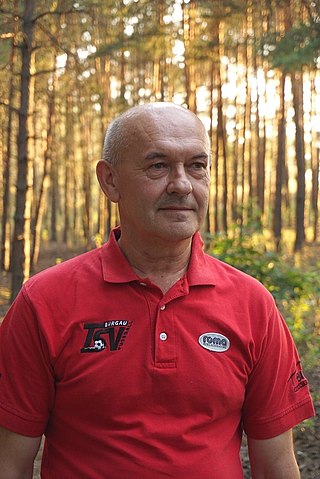Works
Nervi first gained renown for his poems when he was only 18 years old, and 1978 saw the publication of his first collection La turoj de l' ĉefurbo ("The Towers of the Capital"). Although in retrospect some parts are immature, here the young Nervi already showed impressive skill. From his knowledge of classical literature came several poems from this volume, including a poetic drama based on the murder of Agamemnon by Clytemnestra, and a cycle of seven poems, each for one of the Muses.
After the publication of his first book, Nervi continued to write poetry, which appeared in several literary reviews including Fonto and Literatura Foiro. In 1986 his translation in Esperanto of Il repertorio della memoria by Eugenio Montale was used as the introduction to Spomenka Štimec's novel Ombro sur interna pejzaĝo. 1996 saw the appearance of his translation of Franz Kafka's The Metamorphosis .
Nervi's second collection, Havenoj ("Ports") was published in 2001. Leaving behind the classical themes of La turoj de l' ĉefurbo, Havenoj contains much sea imagery and was also inspired in part by his studies of German literature, for which he received his second doctorate.
For his poetry Nervi has gained several literary prizes.

Franz Kafka was a German-speaking Bohemian novelist and short-story writer based in Prague, who is widely regarded as one of the major figures of 20th-century literature. His work fuses elements of realism and the fantastic. It typically features isolated protagonists facing bizarre or surrealistic predicaments and incomprehensible socio-bureaucratic powers. It has been interpreted as exploring themes of alienation, existential anxiety, guilt, and absurdity. His best known works include the novella The Metamorphosis and novels The Trial and The Castle. The term Kafkaesque has entered English to describe absurd situations like those depicted in his writing.

Ossian is the narrator and purported author of a cycle of epic poems published by the Scottish poet James Macpherson, originally as Fingal (1761) and Temora (1763), and later combined under the title The Poems of Ossian. Macpherson claimed to have collected word-of-mouth material in Scottish Gaelic, said to be from ancient sources, and that the work was his translation of that material. Ossian is based on Oisín, son of Fionn mac Cumhaill, a legendary bard in Irish mythology. Contemporary critics were divided in their view of the work's authenticity, but the current consensus is that Macpherson largely composed the poems himself, drawing in part on traditional Gaelic poetry he had collected.

Kálmán Kalocsay was a Hungarian Esperantist poet, translator and editor who considerably influenced Esperanto culture, both in its literature and in the language itself, through his original poetry and his translations of literary works from his native Hungarian and other languages of Europe. His name is sometimes Esperantized as Kolomano Kaloĉajo, and some of his work was published under various pseudonyms, including C.E.R. Bumy, Kopar, Alex Kay, K. Stelov, Malice Pik and Peter Peneter.

Literature in the Esperanto language began before the first official publication in Esperanto in 1887: the language's creator, L. L. Zamenhof, translated poetry and prose into the language as he was developing it as a test of its completeness and expressiveness, and published several translations and a short original poem as an appendix to the first book on the language, Unua Libro. Other early speakers wrote poetry, stories, and essays in the language; Henri Vallienne was the first to write novels in Esperanto. The first female Esperanto novelist was Edith Alleyne Sinnotte with her book Lilio published in 1918. Except for a handful of poems, most of the literature from Esperanto's first two decades is now regarded as of historical interest only.

William Auld was a British poet, author, translator and magazine editor who wrote chiefly in Esperanto.

Edwin Muir CBE was a Scottish poet, novelist and translator. Born on a farm in Deerness, a parish of Orkney, Scotland, he is remembered for his deeply felt and vivid poetry written in plain language and with few stylistic preoccupations.

Ahmad Shamlou was an Iranian poet, writer, and journalist. Shamlou was arguably the most influential poet of modern Iran. His initial poetry was influenced by and in the tradition of Nima Youshij. In fact, Abdolali Dastgheib, Iranian literary critic, argues that Shamlou is one of the pioneers of modern Persian poetry and has had the greatest influence, after Nima, on Iranian poets of his era. Shamlou's poetry is complex, yet his imagery, which contributes significantly to the intensity of his poems, is accessible. As the base, he uses the traditional imagery familiar to his Iranian audience through the works of Persian masters like Hafez and Omar Khayyám. For infrastructure and impact, he uses a kind of everyday imagery in which personified oxymoronic elements are spiked with an unreal combination of the abstract and the concrete thus far unprecedented in Persian poetry, which distressed some of the admirers of more traditional poetry.

Jèrriais literature is literature in Jèrriais, the Norman dialect of Jersey in the Channel Islands.

Giovanni Placido Agostino Pascoli was an Italian poet, classical scholar and an emblematic figure of Italian literature in the late nineteenth century. Alongside Gabriele D'Annunzio, he was one of the greatest Italian decadent poets.

Antoni Grabowski was a Polish chemical engineer, and an activist of the early Esperanto movement. His translations had an influential impact on the development of Esperanto into a language of literature.

Julio Baghy was a Hungarian actor and one of the leading authors of the Esperanto movement. He is the author of several famous novels but it is particularly in the field of poetry that he proved his mastery of Esperanto.
Jeremy Adler is a British scholar and poet, and emeritus professor and senior research fellow at King's College London. As a poet he is known especially for his concrete poetry and artist's books. As an academic he is known for his work on German literature specialising in the Age of Goethe, Romanticism, Expressionism and Modernism with contributions on figures such as Goethe, Hölderlin, and Kafka.

Aribert Reimann is a German composer, pianist and accompanist, known especially for his literary operas. His version of Shakespeare's King Lear, the opera Lear, was written at the suggestion of Dietrich Fischer-Dieskau, who sang the title role. His opera Medea after Grillparzer's play premiered in 2010 at the Vienna State Opera. He was a professor of contemporary Lied in Hamburg and Berlin. In 2011, he was awarded the Ernst von Siemens Music Prize for his life's work.

Baldur Ragnarsson was an Icelandic poet and author of Esperanto works. He was a teacher and a superintendent of schools in Iceland.
The literature of Luxembourg is little known beyond the country's borders, partly because Luxembourg authors write in one or more of the three official languages, partly because many works are specifically directed to a local readership. Furthermore, it was not until the 19th century that the literature of Luxembourg began to develop in parallel with growing awareness of the country's national identity following the Treaty of Paris (1815) and the Treaty of London (1867).

Ventseslav Konstantinov was a Bulgarian writer, aphorist and translator of German and English literature.
Milan Richter is a Slovak writer, playwright, translator, publisher and a former high-ranking diplomat.

Poetry of Scotland includes all forms of verse written in Brythonic, Latin, Scottish Gaelic, Scots, French, English and Esperanto and any language in which poetry has been written within the boundaries of modern Scotland, or by Scottish people.

Petro Palyvoda — Ukrainian and Esperanto poet and translator, lives in Kyiv region, Ukraine. Some works have been translated and published in German, Croatian and Italian.















